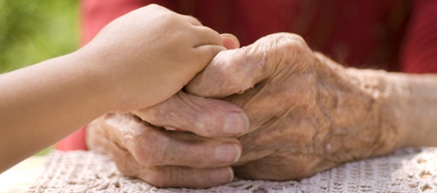Preserving kinship ties is considered to be a very important part of Islam. This generally refers to maintaining good relationships with both your close and extended relatives and upholding the rights Islam gives to them. There is a prophetic tradition in Islam that says, “Whoever believes in Allah and the Last Day, let him maintain the bonds of kinship.” (Bukhari) As most people with large families know, this is easier said than done. When you add children into the mix, it can become even more challenging.
During the first part of my childhood, I grew up in a large extended family of grandparents, uncles, aunts and cousins (12 of us at one point), all under one roof. I remember these early years with fondness—friends to play with, lots of attention and many people to bother. Once my parents moved out, life became quieter, but I always missed the chaos of the big house full of people, the constant stream of visitors and my cousins and favourite uncle around to play with whenever I wanted.
As an adult, I resolved that I would run my home as my grandparents had. We have an “open house” of sorts, welcoming guests, always making room for one more person to stay for dinner or the night, and never turning away family. This is pretty much the way my husband and I have “played house.” We have guests stopover throughout the year and extended family come and stay with us for six months at a time. Friends that have been new to this country have stayed whilst they find their feet, our local mosque sometimes sends guests here and we hold study circles and lectures when a speaker is visiting the mosque. When my grandmother lived with us and then my mother-in-law, we had guests late into the night, with the family gathering for dinner, including my parents or uncles when they heard that a certain guest has turned up. Often on weekends, visitors would sit past midnight, reminiscing with cups of cardamom-laced green tea in their hands and plates of sweets and nuts.
Sounds a little too good to be true and it probably is. The description above doesn’t say anything about running around to pull a meal together, trying to rugby-tackle the kids into bed whilst they are distracted by guests or having school or work the next morning, which is too few hours away. Now that I have my own household to manage, I realise how hard it must have been on the adults in my grandparent’s house—the lack of privacy, the futility of setting your own routines or timetable, the inability to live or parent fully as you choose. When I look back as an adult with the rose-tinted specs taken off, I can remember the family fights we kids used to watch from the stairs with glee, and the tired grumbling of the women in the household at all the guests.
Despite this, I love the way we run our house. It feels like a safe place our family can gather, break bread and debate the latest family drama that always seems to be going on. Also, because of my faith, I feel very strongly obliged to allow my extended family access to my home. However this has implications for the way we raise our children.
My mother-in-law stays with us six months every year (summers in London, winters in sunny Lahore—sounds good to me). She is a great help with the school run and with keeping the house in order. Having her stay with us also makes my husband feel that he is fulfilling his responsibility toward her:
“A man came to the Prophet (Peace be upon Him) and asked him: ‘O Prophet of Allah! Who is the most deserving and worthy of my good company?’
Allah’s Prophet (Peace be upon Him) answered: “Your mother.”
The man asked: ‘Who comes next after her?’
He said: “Your mother.”
The man asked again: ‘Who comes next after her?’
He said: “Your mother.”
The man asked again: ‘Who comes next after her?’
He said: “Your father.”
(Bukhari No.5625 and Muslim No.2548)
Your Lord has decreed that you worship none but Him; and that you be good to your parents. If one of them or both reach old age in your life, do not say to them a word of the faintest complaint or disrespect, nor shout at them; but address them in terms of honour. (Quran 17:23)
At the same time, bedtime routines and discipline go out the window. For most of the six months she is here, it’s impossible to get the kids in bed on time. I find them hiding out in their grandmother’s room and sneaking in food and toys. Their behaviour is also harder to manage as they have a second port of call in their grandmother when I am annoyed with them.
I find the same with my mother. She lives nearby and her home is our weekend haunt. I get to rest and the children can spend time with their grandmother and aunts (joyfully leaving a trail of mess and destruction around my mum’s immaculate house). At the same time, she plies them with large quantities of chocolate and soda despite my attempts at trying to keep the taste of sugary foods out of their diet. My daughter teams up with her grandmother and the two of them conspire to break all of my rules. (I have lost count of the number of time I have had to confiscate designer lipsticks that my mum has saved the last bits of for her).
Keeping on good terms with extended family therefore means that I can’t always do things exactly as I wish. After the initial frustration, I am starting to think this is not all bad. I believe in raising our children by modelling the behaviour we want to see in them. Do we want children who do things exactly as they want, never taking into account anyone else’s feelings, desires or viewpoints? I certainly don’t want my children to be people who never accommodate others or are never willing to compromise or sacrifice a little for the happiness of others.
As much as maintaining an open house has its drawbacks—my mother-in-law and mother can drive me up the walls sometimes, taking care of guests can be exhausting and keeping a sensible routine for the kids is an uphill struggle— I don’t begrudge any of it. I believe that upholding family ties as my faith requires has enough long-term benefits to balance out the challenges: wonderful memories, lots of love and attention and the wisdom and blessings we believe come from your elders. And who said doing anything good was ever easy?




































I love the concept of an “open house”, Umm, and I agree that, despite the stresses and inconveniences that you sow honestly described, there are many benefits for everyone. Hats off to you for being to create this kind of home here in the U.S. In my own life, it’s been hard to create this kind of home because we have moved so much around the U.S. I feel fortunate that my kids get to experience this sense of warmth and camaraderie when we visit Turkish each year. My mother-in-law definitely has an open door policy, and friends, relatives and neighbors drop by at all hours. It took me a while to get used to what I saw, through my mainstream American cultural lens, as “rude”. My Turkish relatives, however, take it in stride. Years ago I remember reading something about “fremily” – friends + family – referring to building a community out of friends when you don’t have family living close by. That’s something I aspire to, and, it sounds as though you’ve create your own fremily.